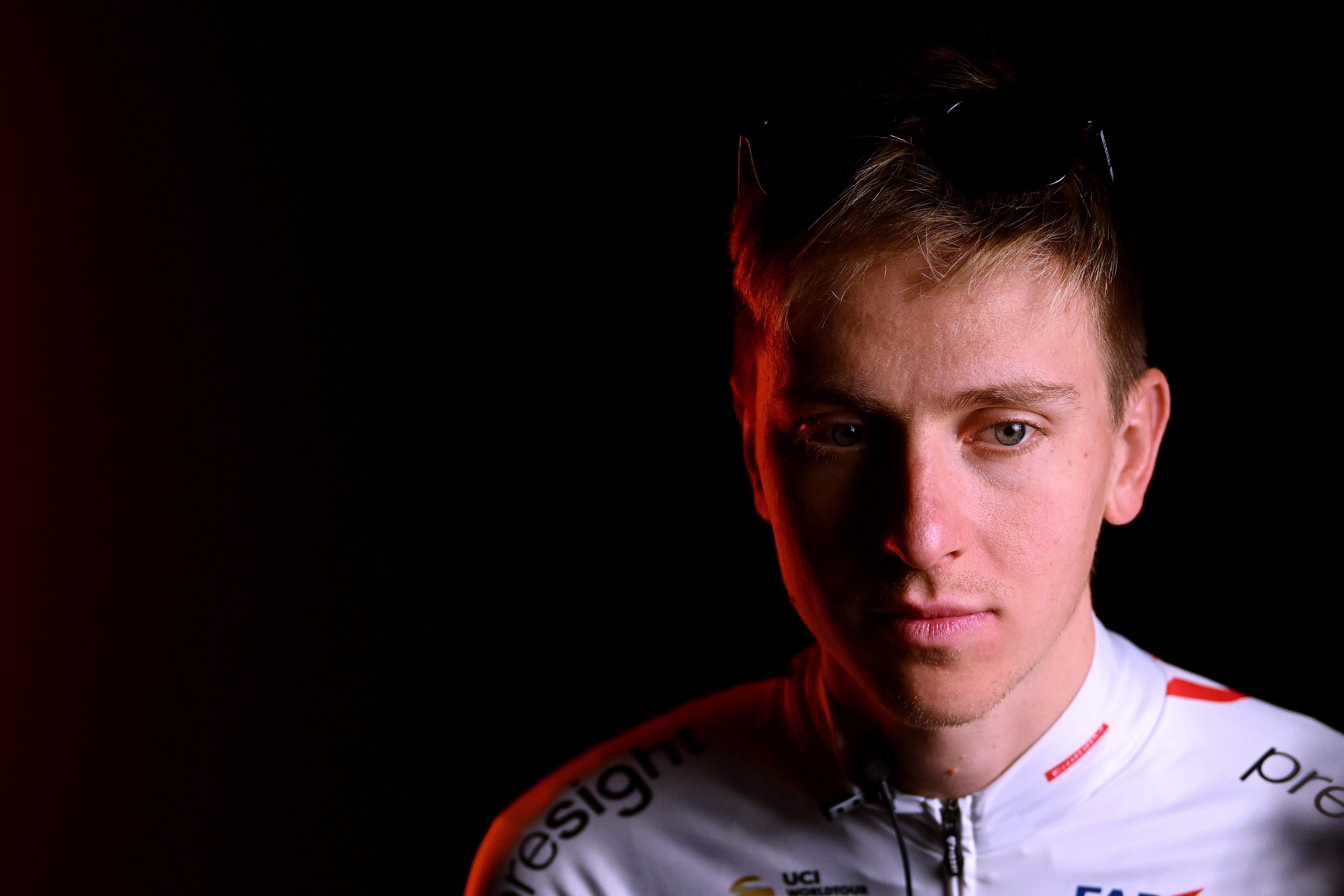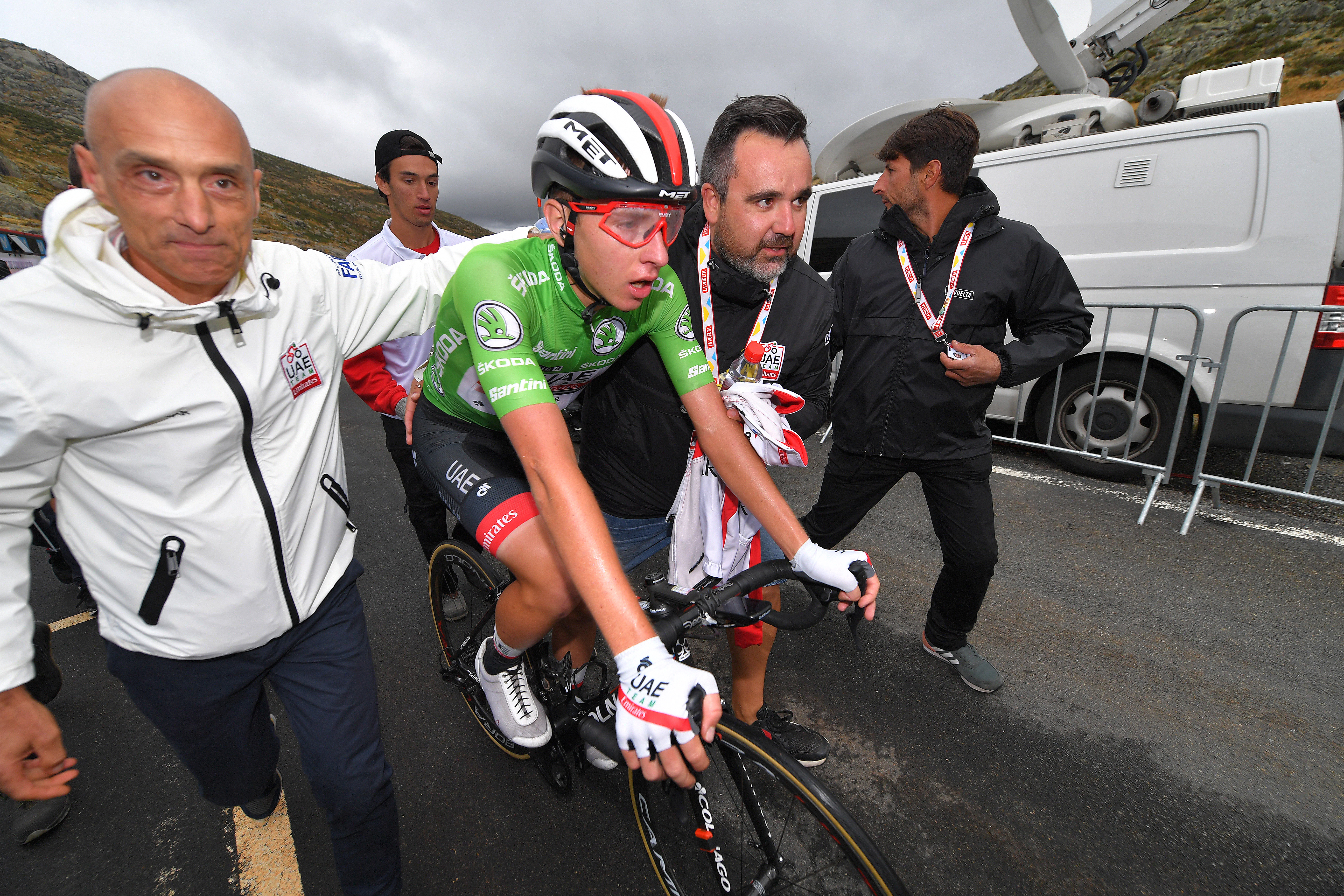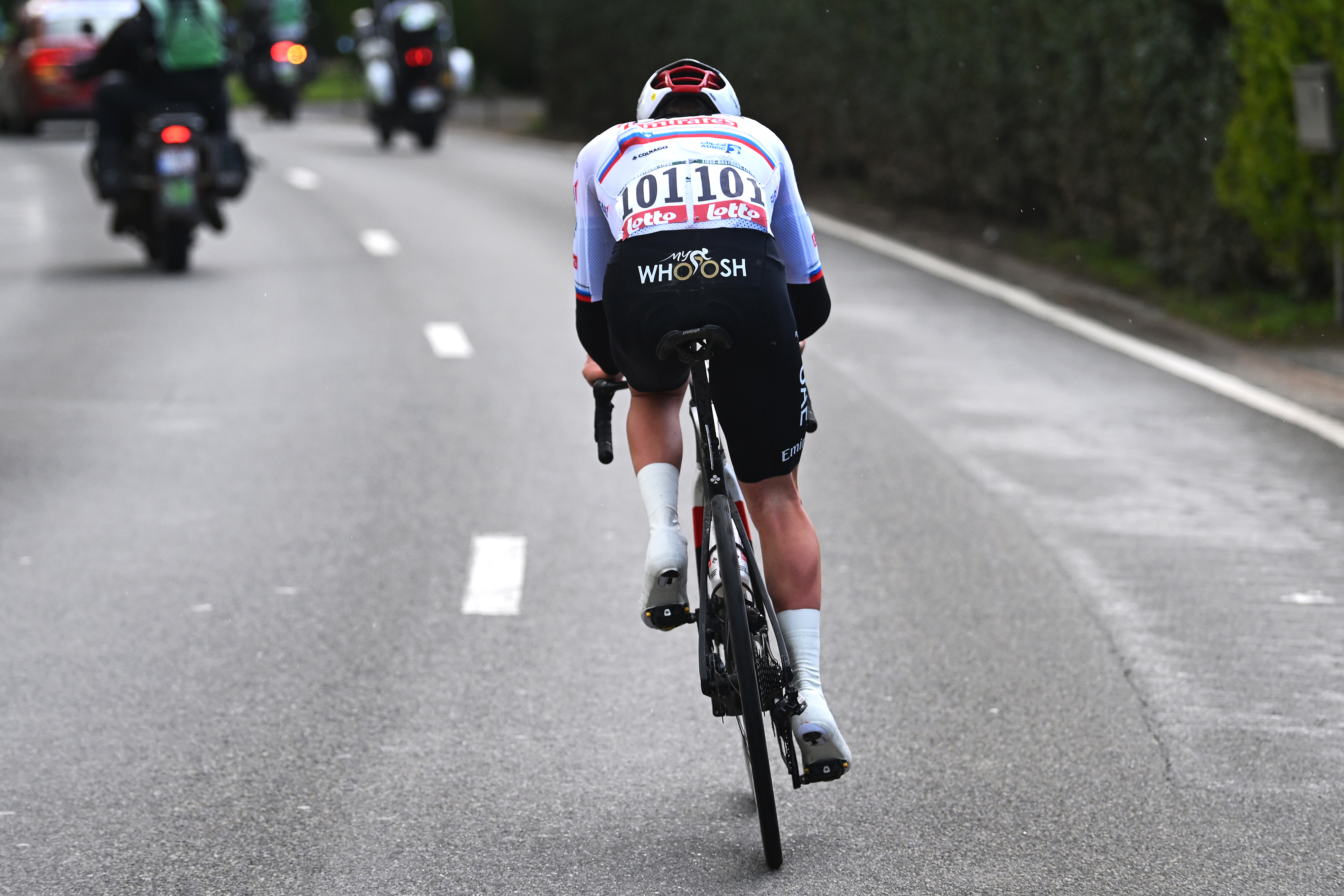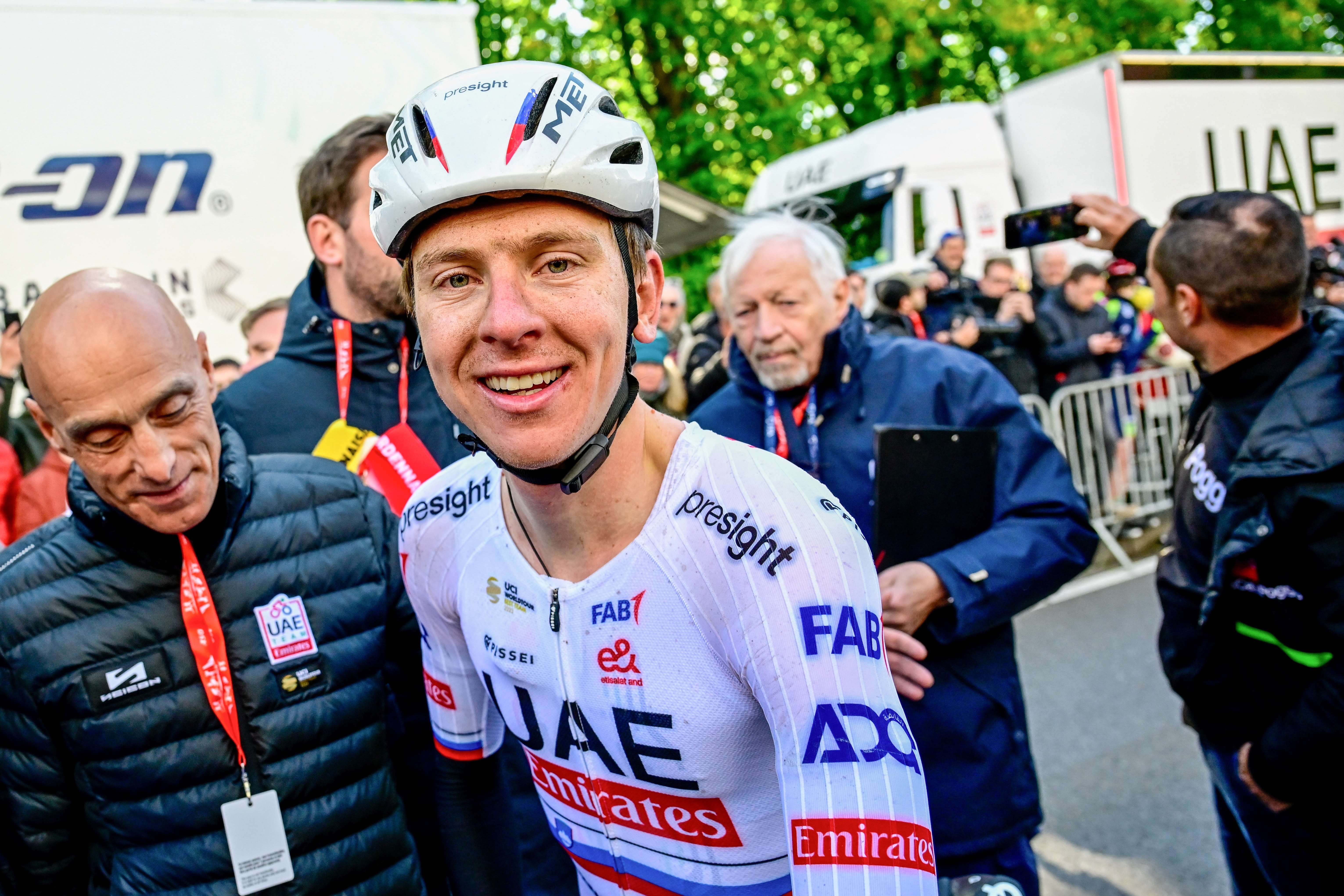

The evening after the 2024 Volta a Catalunya had ended, a slight figure in a UAE Team Emirates tracksuit could be seen wandering alone through the departure lounge of Barcelona airport’s Terminal 1, his only possible concession to anonymity some massive earphones and an equally large baseball cap to cover his telltale quiff.
Having had hordes of fans chanting his name just a few hours earlier after his devastating ride to victory in Barcelona – and, indeed, the entire cycling world at his feet – here, then, was a rather different image of Tadej Pogačar. With Volta already consigned to the past, his plane ride to an altitude camp in southern Spain, his next stop before the Giro d’Italia, was already his next objective. There was no VIP treatment, mind. No fast-track through the boarding queues, no seat option other than economy class on the low-budget flight, and certainly no cheesy PA announcement by the pilot along the lines of “A special welcome to the number one bike rider in the world.’
For the next couple of hours, Pogačar went completely unnoticed by those around him. Then when the plane touched down, he just grabbed his bag from the overhead lockers, turned for the door, and was gone. Just like anybody would.
You could argue that in terms of logistics, it’s purely common sense that dictates that if Pogačar has to get from A to B and the most practical way is to travel solo on a low-budget airline then so be it. Then again, the days when Lance Armstrong would jet around from race to race in a private plane are still not so far off in cycling history. No matter, that lack of kid-gloves-treatment for his flight to an altitude camp was in keeping with how Pogačar and UAE have made their relationship function over the years.
Pogačar may well be all but in a league of his own as a rider and UAE may well have some of the deepest pockets in the WorldTour, but rather than make an excessive fuss about him – or indeed create a specially designed ‘team Tadej’ to ensure his every need is attended to – the staff that work with him do so as just one part of their normal roles within the squad. And that, too, is intentional.
“This is UAE Team Emirates, not Pogi Team,” team manager Joxean Fernandez Matxin tells Cyclingnews. “In the sense that he’s the number one in the world, we’d be the first to say it and to value him and to protect him and we’re very proud of him.
“But be it riders or staff, we try to ensure that everybody matters and that no given soigneur, say, is more important than another soigneur. We cover and work for each other, and to stick with the example of the soigneurs for a moment, it works both ways.
“For example, Tadej wouldn’t even be asked if he minded getting a massage from one of them in particular. And he’d be equally fine with that. So in that sense, there is no ‘Tadej Team.’ There’s just UAE Team Emirates.”
Yet at the same time, Matxin agrees that UAE Team Emirates are engaged in a never-ending quest to be as well-prepared as possible, an overarching strategy that will once again come into play this May at the Giro d’Italia. And how that quest is structured, be it the broad brushstrokes of planning a season or the smallest question about which flight to get to a training camp, inevitably involves input from their star GC rider.

Everything has to have a starting point, too, and Matxin harks back to the winter of 2018-19, and a crunch meeting shortly after he had taken over as general manager.
“That year we had the usual get-together to work out the rider programmes for the season,” he says. “At the time we had some very good up-and-coming riders like the Oliveira brothers, [Rui and Ivo] and Cristian Muñoz, but I can remember pointing out to the sports directors that we had also signed some champions of the calibre of Tadej, and Jasper Philipsen, too. What I said was basically that we couldn’t just treat them as young riders. We had to treat them like champions from the word go and change their race programmes accordingly.
“So we brought Tadej into some new races on the programme like the Volta a Algarve and California, which he won, and then put him in Itzulia Basque Country – which he didn’t win, but he was working for Dan Martin, and he might have won it if he hadn’t been doing that.”
2019 also marked the moment when Pogačar and the team simultaneously stepped up several notches in terms of his Grand Tour preparation, Matxin explains, bringing forward his three-week debut to that year’s Vuelta a España. And after a couple of weeks in the Vuelta, he was going so well on GC that the initial idea of having him waiting until his third season to fight for a Grand Tour was quietly binned as well. He would place third in Madrid.
“He had said to me that year that if he got to week two of the Vuelta and was really tired, then he’d quit,” Matxin says. “But I sat him down and said, ‘I consider you a champion and I don’t want you starting a race thinking you’ll abandon. I’d prefer you to ease back on two or three stages if you’re tired, and then keep going right the way through.
“With Philipsen our approach was different, because as a sprinter it makes no sense to continue through the high mountains if you’re tired and when you’ve done the first two flatter weeks where you can make things count. But with Tadej our strategy was completely the opposite, he did the whole Vuelta.
“Then in 2020, when the normal thing would have been to take him to the Vuelta or Giro d’Italia to fight for that, we raised the bar again and put him in the Tour de France straightaway.”
Pogačar corroborated the idea he and his team raised their game in tandem in an interview with Emirati newspaper The National last Autumn.
"When I came to the team five years ago, we were sitting in one conference room in a hotel and the bosses were saying, ‘We want to be the best team’, and at that time, I thought it was impossible," Pogačar told the newspaper.
"But they believed we could do it. We worked towards this goal and achieved it quite early. I saw such an improvement from year to year.”

In order to ensure that Team UAE did not become ‘Team Pogi’ during that process, Matxin says the team insisted on keeping all staff members working across the board and not specifically with their star rider. At the same time, that strategy would hardly function without Pogačar’s own buy-in, and his own preference for being treated no differently to the rest.
“He’s changed a bit since he came on the team, but only in the way every 20-year-old changes as the years go by. People grow up,” soigneur Joseba Elguezabal tells Cyclingnews.
“Essentially, he’s the same guy he ever was – the same person who likes his jokes, who likes his food and loves riding his bikes, who is really friendly and who has a smile for everybody. He’s number one on the bike and off it, too.
“Equally, I don’t see any difference between the way he gets treated and the way the rest of the riders do. In the training camp, for example, when we’re all in the same hotel, nobody gets a better or worse deal. The thing is, we’re all rowing in the same direction, and from rider number 1 to rider number 30 at UAE Team Emirates, they’re all treated well.”
As for who works with whom in the team and who gets to work with Pogačar, Matxin cites the example of Pogačar’s usual mechanic. “It’s often a question of logistics. For example, take the mechanic. Rather than lugging his bike around from airport to airport, it makes sense for him to look after that because he lives seven kilometres away from Tadej,” he says.
“So it’s not a question of Tadej choosing one particular mechanic for his personal preference. It’s more that this mechanic is really good for everybody on the team and he happens to live close by.”
It was a similarly organic process when it came to Andrej Hauptmann being the sports director. Along with Matxin, the Slovenian is usually behind the steering wheel in the lead team car when it comes to Pogačar’s races.
“I first met Andrej a long time ago, back when he was with [Italian squad] Vini Calderola. Another of the reasons why we asked him to come on board was because we had Tadej and Jan Polanc, both Slovenians on the team,” he explains.

This absence of special treatment has a definite advantage, too, when it comes to questions such as the changeover of team medic during the winter of 2023-24 for Pogačar during the winter. The Slovenian went from the direct guidance of Iñigo San Millan, now working both for UAE and a top football team, to being supervised by another doctor, Spaniard Javier Sola, with San Millan taking a more indirect role. What made the switch smoother was that, as Sola explains, he is handling multiple riders in UAE, not just Pogačar.
“A change happened, and this was it – there are five trainers in the team and it’s like he was just another rider, I got a call from Matxin, I got a list of riders to work with,” Sola told Cyclingnews and El Pais over the winter.
“It’s a bigger responsibility, but I always do the best I can, and we have a good group of doctors, and you get lots of support. So having that helps you stay calm.”
But that team effort doesn’t affect, of course, his appreciation of what Pogačar can do on the bike.
“He’s the best rider in the world, a force of nature, and there’s not much more to add than that,” Sola said.
“What really struck me is how quickly he gets into top condition. His [power] numbers are spectacular regardless, but when he’s trained for four weeks, then you say to yourself - Heck, he’s improving way faster than the rest.”
Part of that ability to benefit more from training than other riders, Sola says, is due to genetics. “He’s basically been touched with a magic wand, and he can assimilate everything better than other riders,” he says. “But his biggest virtue, in any case, is that he enjoys it all so much, be it training or racing.”
Elguezabal is equally eloquent when it comes to Pogačar’s exceptional muscular qualities from a soigneur’s point of view, although he struggles to define their precise nature. “It’s something I’ve come across before a little in other riders, but in his case it really stands out. Only another soigneur, though, would really get what I’m getting at,” he says, before doing his best to explain the inexplicable for anybody but a fellow practitioner.
“The muscle groups of a climber, a sprinter, a Classics rider or a stage racer all differ from each other in subtle ways. But Tadej is so exceptional that when it comes to a massage even his muscles are in a class of his own.
“It’s not just me that says that. All the soigneurs on the UAE team give massages to all the different riders when we’re at training camp, and they’ve all noticed the same thing about Tadej. It’s just spectacular.”
Elguezabal also cites Pogačar’s extraordinary powers of recovery as one of his many gifts as a racer: “I was giving him a massage after Vallter in the Volta a Catalunya, a stage where he’d attacked in the rain and gone solo to win, and in barely a minute he was back to normal. It was just staggering.”

Like everybody else Cyclingnews talks to at UAE about Pogačar’s working relationships with his squad, Gorka Prieto, the team nutritionist since 2020, emphasises that one of Pogačar’s qualities is that despite his exceptional nature as a rider, he is anything but exceptionally demanding.
“Of all the riders on the team, when it comes to nutrition, I’d say he’s the most straightforward of all,” he says. “There are some who are way fussier, the ones who insist on having white pasta all the time and you just can’t convince them otherwise. But Tadej is the complete opposite.
“You’ll tell him, ‘You’ve got to eat this’ and he’ll eat it. He particularly likes some kinds of sauce that our Italian chef makes with pasta. But in any case, he’s anything but a complainer.”
This extreme flexibility when it comes to food is definitely an advantage for Pogačar in all sorts of ways, but one specific example, as Prieto explains, is that there has been some significant change in the last few years regarding carbohydrate consumption.
“Riders’ carbohydrate consumption is much higher too,” he says. “Before they would be on a maximum of 90 grams of carbohydrates per hour of exercise, now it’s 120 or 130.”
That figure is even more striking given that a few years back, San Millan was already recommending that his riders increase their carbohydrate consumption to 80 grams per hour, up from a more accepted norm of 50. Nowadays, that intake is even higher.
Quite apart from getting the carbs in, a major part of nutritionists’ work in bike teams is predicting how much riders will need to consume depending on their role in a race. “It’s not the same sitting in the middle of the bunch compared to if you’re off the front,” as Prieto puts it.
In turn, that raises the question of how a team nutritionist handles a rider like Pogačar when he has a predilection for, say, solo attacks at 80 kilometres from the finish in Strade Bianche.
“It’s not a problem, he’s very intelligent and he knows that if he goes off the front at x kilometres from the line, he’s got to eat this much,” Prieto says.
“He’s been trained, if you like, to know that if he goes at such-and-such a speed, he has to eat that much more, and if he’s sticking in the bunch, he needs to eat that much less.”
Sometimes it all goes awry, though, as happened on the Col du Granon in the 2022 Tour de France, when Pogačar effectively lost the race because of a hunger flat. But it seems that rather than get overly hung up on that stage and its consequences, to judge from Prieto’s reaction, it was better to look for solutions in the future.
“You remind him – eat, eat, eat. But at the end of the day, sometimes because of the stress of a race, they don’t follow your instructions to the letter,” he agrees.
“Trying to ensure they do is very much up to the directors, we remind them constantly over the radios in the team car to remind the riders: And then there are stickers on the bike telling them where they know where the bidons will be handed out, where the feeds will be, and that’s a way of reminding them: eat, eat, eat.
“The stress you feel in any race and certain circumstances can always cause a slip-up. But you learn from your errors and let’s just hope it [the Col du Granon] doesn’t happen again.”

While the dedication and professional interest in their riders’ success is palpable in all the UAE team staff’s comments, the cynical might say that given the knock-on benefits of a team winning races, they are bound to feel that way. However, many years ago, former longstanding top-level domestique turns sports director Charly Wegelius told Cyclingnews that working for a leader for long spells of time, even if that leader is barely able to connect on a human level with his teammates and staff, inevitably creates an emotional bond.
In the case of the affable Pogačar and his team, the bond is perhaps even greater still, which surely benefits their willingness to work as a unit. For example, when Pogačar is on the massage table, Elguezabal says he and the rider share everything from musical tastes – Pogačar is one for rap, Elguezabal more in favour of reggaeton – to impromptu language classes in Euskera and Spanish, to long discussions about their different hobbies, with the rider being a huge fan of cars and the soigneur of horses.
When the Basque recently bought an English thoroughbred, Pogačar even paid him a visit at home to see the animal in question. The name? Pogi. How could it have been anything else?
But Elguezabal has also had had more than one occasion to see how Pogačar reacts to victories, too, like the one he’ll be seeking to capture in the Giro this May.
“He’s not overly emotional. If he wins, he’s pleased, but it’s nothing excessive and if he loses, he doesn’t lose the plot, either,” he says. But as Eguezabal recently told El País, he will always remember the day that Pogačar gave him a heartfelt hug without saying a word after one memorable triumph: “And that wasn’t in a Tour at all, maybe because he thought beforehand he could win those. It was when he won the Tour of Flanders.”
Pogačar eschewed the cobbles this year in preparation for a tilt at the Giro-Tour double, which Matxin explains is being a target this year, rather than any other, for multiple reasons.
“Firstly, it’s because the Giro this year is a bit less tough, there are 11,000 metres less of vertical climbing than last year, and that’s 11,000 metres less of tiredness, both mental and physically,” he says. “But above all, we’ve opted for the Giro-Tour double because this year there are just about five weeks between the two. Other years that total has barely reached four.
“On top of that we’ve reduced the number of race days prior to the Giro itself drastically. He’s done just four different races up to now this season, and only one of those was a stage race [Catalunya], bringing the total down to 10 days.
“The last part of the preparation for the Giro-Tour double has been an altitude camp until April 12, then Liege-Bastogne-Liege, before going back home until the Giro. After he does the Giro, he’ll have one week at home again and then go back to altitude before the Tour.”
Yet what is striking, too, is how Matxin’s emphasis when discussing going for the double is very much about how it works in the bigger picture of Pogačar and his relationship with UAE Team Emirates. Which again, is very much in line with the team’s insistence of seeing their star rider as part of a bigger operation, rather than a stand-out figure who needs to be treated differently.
“We wanted initially to try to do a Tour-Vuelta double, but the year we wanted to do it, he was tired after the Tour so that idea got scrapped,” Matxin explains. “But this year, aged 25, we decided he was strong enough to try for both Giro and Tour, and while he’s a rider who doesn’t just want to do it for its own sake, we wanted it to fit in his career in general.
“So this isn’t just happening now because he’s got a contract with us until 2027. We wanted to do it now, this year, because although he can still improve and evolve, even if it’s not a vast amount, this is the right moment to do it.”

Get unlimited access to all of our coverage of the Giro d'Italia - including journalists reporting on the ground, breaking news and analysis from every stage of the race as it happens and more. Find out more.







